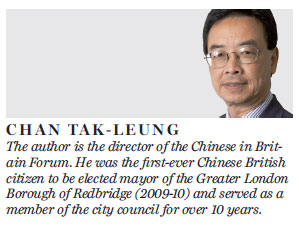Lessons learnt from 79 days of chaos
Updated: 2015-09-25 09:36
By Chan Tak-leung(HK Edition)
|
|||||||||
Chan Tak-leung writes that on the first anniversary of the start of the 'Occupy' campaign, those involved in the illegal protests should reflect on why they failed
The rumor mills have been hard at work in Hong Kong over the last couple of weeks with news that disparate groups of local activists may organize some illegal activities to "commemorate" the anniversary of the "Occupy Central" movement which began last fall.
Those involved in organizing the illegal "Occupy" movement have already accepted failure. They have been playing the "blame game" and avoiding talk of any further occupations. They are perhaps more concerned now about the legal consequences of their actions. They will have to appear in court hearings and be charged with incitement, illegal occupation and other criminal offences. With prison terms and criminal records likely, they now have more urgent issues to consider then planning further illegal occupations.
The fact remains that 79 days of "Occupy" did occur last year and it was definitely something most Hong Kong citizens would like to put behind them. This is because it was 79 days of chaos and heartache for many citizens and businesses. It also hurt Hong Kong's international reputation. It would be far better to reflect on the lessons learnt from it rather than to commemorate it. For it was during this sad time that a city which used to pride itself on respect for the law, social harmony and pragmatism descended into chaos. Hong Kong people became argumentative, confrontational and even violent.
The catalyst for the debates and subsequent illegal activities was the stance taken by the "pan-democrats" after the publication of a white paper on Hong Kong by the State Council in June 2014 and also following the decision of the National People's Congress Standing Committee (NPCSC) on electoral reforms announced in August 2014.
What the first document did was to reiterate and reaffirm the "One Country, Two Systems" principle and the powers conferred to the Hong Kong SAR as enshrined in the Basic Law. However, during the last 25 years, these two key factors which resulted in the establishment of the SAR were either deliberately misinterpreted or wilfully ignored by the "pan-democratic" legislators and other anti-Beijing activists.
The second document conveyed the decision reached by the NPCSC on steps Hong Kong should embark on in order to make "gradual and orderly progress" toward electoral reforms. These will deliver universal suffrage in the Chief Executive election in 2017.
The "pan-democrats" also need to reflect on the fact that both the white paper and the NPCSC decisions were legitimate. It was within China's constitutional powers to issue the "One Country, Two Country" principle and the Basic Law which governed the establishment of the SAR. To label them as anything else would be a blatant breach of the country's constitutional rights.
The big problem which led to last year's chaos was the refusal by radical "pan-democratic" legislators to accept China's sovereignty over Hong Kong under the "One Country, Two Systems" principle. Another factor was their insistence on "public nomination". These pushed the radicals to the point of no return. They, therefore, had no alternative but to be dragged into the "Occupy" movement. But the movement was in turn hijacked by the Hong Kong Federation of Students and Scholarism.
Sadly, these people all failed to consider the importance of delivering universal suffrage to the millions of people in Hong Kong. Instead, they insisted on the implementation of a slogan - "We want genuine universal suffrage", which meant nothing to the people of Hong Kong.
All of these took place when the Hong Kong government was undertaking a comprehensive consultation on how best to improve the membership and representation of the Nominating Committee in order to deliver universal suffrage. To ask the NPCSC to accept the vague concept of "public nomination" was a step too far and in the wrong direction. "Pan-democratic" legislators should realize that their proposal was both illogical and impractical for the NPCSC to consider. On reflection, they should understand that the procedure of referring back to the NPCSC was beyond the prescribed procedures for the SAR as set out in the Basic Law.
Since the "Occupy" movement, some of the "pan-democratic" legislators and other activists have yet to explain whether they have received undeclared sources of funding. Commentators might think it is not the right time for Hong Kong to start looking at legislating Article 23. But in reflecting on events which took place last year, I beg to differ.
The undisputed fact is that China's sovereignty over Hong Kong is paramount and Article 23 refers to the "prohibition of local political organizations and bodies to establishing ties with foreign political organizations and bodies". Both the police and the judiciary will have proper legal powers to investigate and prosecute offenders under the law. No law-abiding citizens who respect and observe the "One Country, Two Systems" principle and the Basic Law should have anything to fear or any reservations about the enactment of this important piece of legislation.

(HK Edition 09/25/2015 page11)